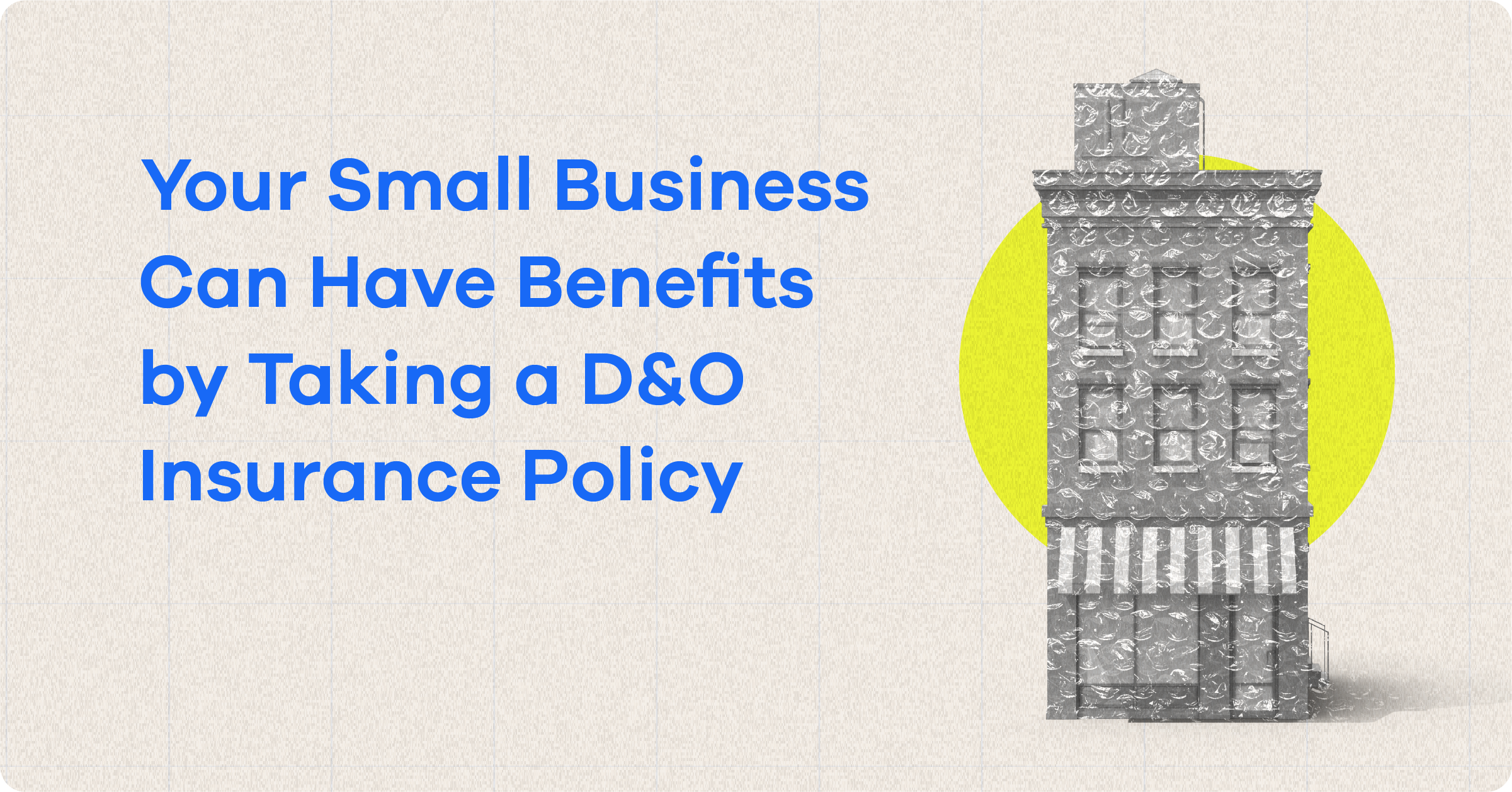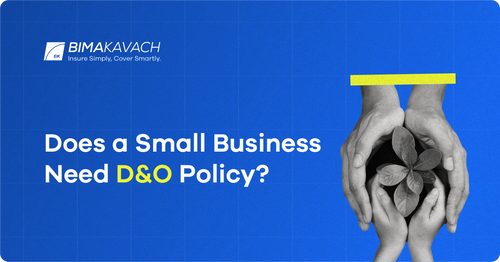Today's businesses mostly operate in a dynamic environment and are subject to cut-throat competition. To survive amidst tough competition, certain important yet seemingly unpopular business decisions need to be made by company management during the course of normal business activities. Thus, such decisions make the directors and officers (or any other employee in a ‘decision-making position’) extremely vulnerable to possible lawsuits and personal financial loss from regulators, customers, competitors, shareholders, employees, and Government bodies.
This is where the ‘safety net’ named Directors’ and officers’ liability insurance (or simply D&O Insurance) becomes extremely necessary for your business. In this article, we will discuss whether D&O insurance is necessary for small businesses and if so, how.
Before that, let’s start with the basics first.
What is Directors and Officers Insurance?
Directors & Officers Insurance is a policy designed to cover the personal financial loss and potential legal liabilities of directors, board members, and other employees in a management/supervisory capacity, in case they get indicted over the decisions taken by them to manage the business. This liability insurance coverage protects the personal assets of the directors and officers and compensates them for settlements and legal defense costs resulting from such suits and litigations.
Does a small business need a D&O policy?
While large corporations and public companies often have Directors' Liability Insurance as part of their risk management strategy, it may not be as common for small private companies to have this coverage. However, a small business can still benefit from D&O Insurance if it has a board of directors liability or board of directors or officers in decision-making positions who could potentially face personal liability and litigation risks for their actions.
You would surely agree that being a small business does not make you immune to potential lawsuits as per Indian corporate law. A costly lawsuit can have a severe impact on the personal fortunes of the aforementioned employees in your business. In the case of small private companies, protection from liability insurance such as D&O insurance becomes even more essential as the personal net worth of the owner or any of the key employees may be attached to the financial health of the business. When a potentially damaging lawsuit comes in the way, small private companies may not quite have the financial ‘muscle power’ enjoyed by a corporate entity and public companies to deal with the exorbitant defense costs.
Get Free Quote in Minutes
If your small business is structured as a corporation or limited liability company (LLC), you may want to consider D&O Insurance to protect your directors and officers. Some industries, such as finance and healthcare, are more heavily regulated than others and may have higher risks of legal action, and may require protection of D&O liability insurance policies. If your small business operates in a highly regulated industry, D&O liability insurance policies may be a good idea.
Moreover, if your small business is owned by multiple people, each owner may have their own interests and may be more likely to sue each other or the directors and officers. Ultimately, the decision to purchase D&O insurance for a small business depends on the specific circumstances and risks of the business. It is a good idea to consult with an insurance professional who can assess the risks and recommend appropriate coverage.

Benefits your small business can have by having a D&O insurance
In addition to what was mentioned above, your small business can have the following advantages by opting for a D&O insurance coverage-
- Reduces the financial burden on your small business
Directors’ and officers’ liability insurance provides coverage for the costs incurred by the private or public company while paying for monetary damages and defense costs for claims brought against its employees in decision-making positions. In other words, D&O insurance policies provide reimbursement to the company for the legal defense costs ( for example, legal fees) it has incurred for these employees. A D&O insurance coverage helps mitigate the risk associated with leadership by providing coverage for costs incurred in legal fees, settlements, and judgments resulting from covered claims. Thus, this coverage can help protect the financial stability of the company. It also helps mitigate the risk of bankruptcy or insolvency that may be caused by unexpected and huge legal defense costs or damages.
- Helps enhance the reputation of your company
Having Directors Liability Insurance in place can demonstrate your commitment to corporate governance and risk management. Thus, it helps enhance the reputation of your company and provides you with a competitive advantage. By having a D&O policy in place, you can send a message that your business is committed to protecting the interests of its stakeholders, including the employees. Moreover, a company that has D&O insurance is more likely to be transparent about its business practices and corporate governance policies. This, in turn, can help increase investor confidence and trust in the company.
- Helps attract and retain the best talents
Directors and Officers Insurance provides a safety net that reduces personal risk and financial exposure for its employees on the board of directors or in a decision-making position. Therefore, it is quite normal for a potential employee to look for D&O insurance before joining the leadership team or board members of your business. This is to make sure that enough protection is offered by your business to cover any legal costs or Directors' Liabilities arising out of performing a fiduciary duty later on. Therefore, if you want to attract talents of high pedigree for decision-making roles in your company, it’s time you opt for D&O insurance, in case you do not have one already.
Moreover, companies that offer D&O Insurance Coverage can differentiate themselves from competitors that do not offer such coverage. This can make the company more attractive to talented individuals who are looking for a strong benefits package. Having D&O Insurance in place demonstrates a commitment to good operational practices. This can help to attract individuals who value these principles and are looking for a company that takes them seriously.
How much does D&O insurance cost?
A pricey lawsuit can have a significant impact on a director's personal fortune as well as the company's fortunes. When you consider the Directors Liabilities it covers, you will find that D&O insurance is an affordable policy. We don't think it makes sense to expose your company, your director, or his personal assets to a lawsuit when you are given the option of transferring the risk to an insurance company.
If your company is financially stable, has a strong debt management plan, and experiences consistent growth, you may need less coverage for D&O insurance (and vice-versa). Other factors to consider when determining a suitable price range include the overall funding, annual income, number of clients, and your risk tolerance. Opting for a higher retention amount can decrease the premium if you are comfortable with taking on more risk. The opposite is also true.
The footnote:
We hope the discussion above will help you understand the types of claims covered by a typical D&O Insurance policy. For the best recommendation on D&O Insurance, you may contact BimaKavach. Here, you can get the best recommendation for any insurance product in just 5 minutes.
Frequently Asked Questions (FAQs)
- What does D&O Insurance include?
The coverage of a typical D&O Insurance provided by an insurance carrier includes the following-
- The costs associated with the defense, investigation, negotiation, and settlement of a covered claim ( including court attendance costs, attorneys’ fees, bail and bond costs, and so on)
- Kidnap & Response Costs
- Employer-Employee Disputes
- Subsidiary coverage
- Pecuniary Penalties
- Coverage for outside directors
- Cover for failure/negligence to monitor any claims related to professional indemnity
- Crisis Communication Costs
- Public Relations Expenses
- Cover for damage to reputation
- Coverage for Retired Directors and Non-Executive Directors
- Severability coverage
- Emergency Costs
2. What are Side A, Side B, and Side C coverage in a D&O insurance policy?
There are 3 types of D&O insurance. An organization can opt for anyone, depending on its needs, business model, and financial position.
· Side A Coverage- Protects the directors and officers against financial liabilities in case the company fails to or is unable to come to their rescue. Here, the individual director or officer is insured and his personal assets are at risk.
· Side B Coverage- Covers directors and officers against liabilities where the organisation grants the indemnification. Here, the organisation is insured and its corporate assets are at risk.
· Side C Coverage- It is basically an extension of the Side B Coverage. It provides coverage for the company (or organization) itself, for claims brought against it by third parties. This coverage provides protection for the company for losses it incurs as a result of claims brought against it for wrongful acts by its directors and officers while performing their fiduciary duties. Under this coverage, the organization is insured and its corporate assets are at risk.
- Is the D&O insurance coverage a costly one?
When you consider the liability it covers, you will find D&O insurance not quite expensive as far as insurance cost is concerned. A costly lawsuit can have a severe impact on the personal fortunes of the directors. When you have the option to transfer the risk to an insurance company, we think it does not make sense to expose yourself as a director or your personal assets to a lawsuit.

